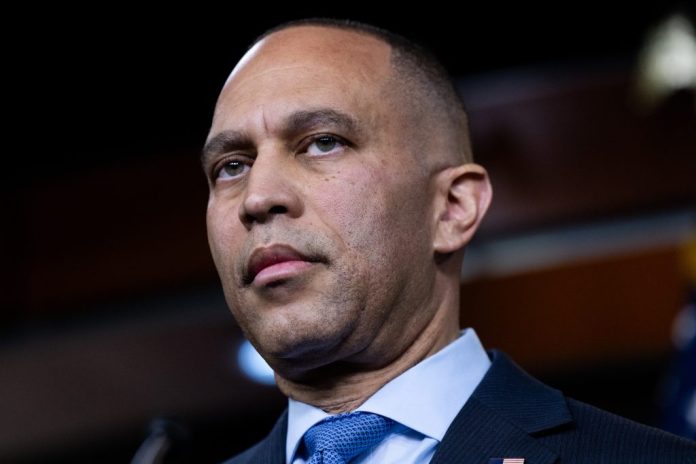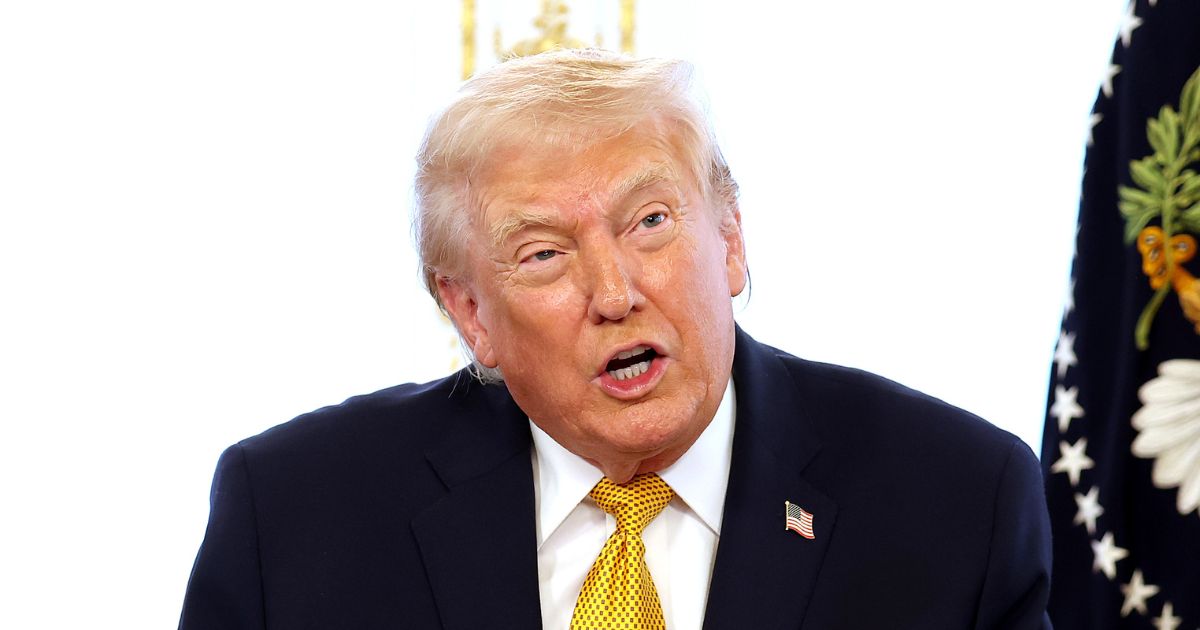Trump flexes his muscle in Congress in preview of second-term power struggles – Washington Examiner
The article discusses former President Donald Trump’s increasing influence in Congress as he seeks a second term in the White House, particularly focusing on recent tensions with House Republicans over government spending and election security. Trump urged GOP members to shut down the government unless measures supporting “Election Security” were included in the funding plan, complicating efforts by House Speaker Mike Johnson to pass a continuing resolution before facing a vote. Trump’s direct involvement in legislative matters is framed as a precursor to the challenges Republican leaders will face if he regains the presidency, marking a significant shift in party dynamics and governance.
Political strategists highlight that Trump’s leadership style diverges from traditional presidential-congressional collaboration, as he has a tendency to publicly dictate party agendas, pressuring House members to align with his views. This creates a precarious situation for Speaker Johnson, who may struggle to maintain party unity, especially with the presence of hardline conservatives in the GOP. The piece underscores that a potential Trump presidency could lead to significant power struggles within Congress, with ongoing difficulties expected in enacting legislation and maintaining a stable majority. The historical context of Trump’s relationships with previous House speakers, like Paul Ryan, further illustrates the complex political landscape that leaders will need to navigate to fulfill their legislative responsibilities.
Trump flexes his muscle in Congress in preview of second-term power struggles
Former President Donald Trump called on House Republicans to shut down the government over a spending deal last week, giving GOP lawmakers a glimpse at the chamber’s life under a second Trump administration.
The former president’s wading into congressional affairs caused further problems for Republican leadership, who were trying to whip support for a continuing resolution that attached the voter integrity SAVE Act and would extend funding until March of next year.
Trump, who is running for a second shot at the White House against Vice President Kamala Harris, argued in a Truth Social post that the GOP should not fund the government unless the legislation includes “assurances on Election Security.”
Trump’s words, combined with similar sentiments from his running mate, Sen. J.D. Vance (R-OH), were another nail in the coffin for Speaker Mike Johnson (R-LA), who had to pull the spending bill before it went to the floor for a vote — a precursor to the reality that whoever is speaker will be subjected to Trump’s wishes.
This is not a new move for Trump, who has left his fingerprints all over the GOP since he won the 2016 presidential election. His insistence that he lost the 2020 presidential race to Joe Biden seeped into the SAVE Act, which would prohibit noncitizens from voting in federal elections, as well as the rhetoric of several House Republicans as they fight to keep their razor-thin majority.
If House Republicans keep the majority, they are projected to still have narrow margins, and despite having Trump in the White House, the GOP will have to determine how to navigate policy decisions — especially as the former president is known for posting his thoughts and stances publicly.
“The president is the leader of the party, and being the leader of the party, he sets the tone and the ground rules of how House Republicans are really going to proceed,” Ron Bonjean, a Republican political strategist and former House and Senate GOP spokesman, told the Washington Examiner.
Bonjean said typically, the president and the congressional leaders will discuss decisions “in concert,” but Trump likes to “tell everyone how he sees it.”
“He sees himself as the CEO making those decisions and that House Republicans will have to fall in line and follow suit, or else primary voters, Republican primary voters, are not going to be pleased,” Bonjean added. “If Trump is elected as president once again, the speaker will be doing a lot of the work that the President wants done, implemented as part of his agenda.”
Another problem for Republicans, as shown last week, was that hard-line conservatives who never vote for a CR will make it difficult for Johnson to pass measures along party lines. Even with Trump in the White House, the speaker will, at times, likely need Democrats to push bills across the finish line.
Erin Covey, House analyst for the Cook Political Report, said if Republicans win all of the toss-up seats, they could have a 14-seat majority — but that’s still not a huge majority to defend “how much damage” the party’s right flank can enact.
“Either way, you know, it’s not going to be a big enough majority for whoever the hypothetical speaker is to govern comfortably,” Covey said in an interview with the Washington Examiner. “They’re going to have to keep their coalition together.”
Bonjean said Republican congressional leadership is going to have to find ways to “work with and around the president” in order to protect members and the majority from “potential legislative threats that could hurt their chances at reelection.”
In April, Trump got involved in infighting between Republicans on the Judiciary and Intelligence committees when the House needed to renew Section 702 of the Foreign Intelligence Surveillance Act, a key surveillance tool essential to national security. The House passed the legislation, but not without opposition from the former president, who created a more complicated situation for Johnson as some of his allies began to reconsider their position on reauthorization.
Trump’s support of Johnson in the spring also helped save the speaker from an ousting attempt over the last spending deal the House passed in February. Whether Trump would save Johnson remains to be seen, as the former president’s track record with speakers has been precarious at best.
Former Republican Speaker Paul Ryan, who served as leader from 2015 to 2019, had to bear the brunt of Trump’s first term. Ryan cooperated with Trump for two years to pass legislation, including the 2017 tax cut, but they famously did not like each other.
“I felt a major onset of responsibility to help the institutions survive,” Ryan told Politico in 2019. “So, from the next day on, my mantra was: ‘Only one person can be speaker of the House. I’m not a pundit, I’m not a think-tanker. Our job from now on is to build up the country’s antibodies … to have the guardrails up, to drive the car down the middle of the road, and don’t let the car go off into the ditch.’”
“We had more arguments with each other than pleasant conversations, over the last two years,” the former speaker added. “And it never leaked.”
Ryan has since been an outspoken critic of the former president and said he won’t vote for Trump in November. Whether this will be replicated in the relationship between Trump and Johnson, who intends to keep the speaker’s gavel next Congres, remains to be seen.
“Presidents tend to have more leverage to get their way with House majorities than candidates for President and I would expect Trump to use that leverage to his maximum ability,” John Feehery, Republican strategist, told the Washington Examiner.
However, Feehery said Trump “tends to be more pragmatic” when he is in charge, arguing that he may temper the abrasiveness shown in his Truth Social posts as a presidential candidate.
“I doubt very seriously that the speaker and the president will be on opposite sides of anything publicly should Republicans keep the House and Trump wins,” Feehery added. “That’s not how Congress works.”
For Republican members, Covey said their biggest concern will be their ability to win a primary.
“And so a lot of times, that looks like appeasing Trump to make sure that he doesn’t come out against you personally, or to make sure he doesn’t back someone else to challenge you in the primaries,” Covey said. “Trump has a huge amount of power still over these Republican members’ careers.”
“It’s safe to say that Trump will maintain his hold, kind of, on the Republican Party,” Covey added.
" Conservative News Daily does not always share or support the views and opinions expressed here; they are just those of the writer."




